In the pursuit of personal excellence, we often find ourselves entangled in a myriad of ideologies and practices.
The responsibility of utilizing our inherent abilities and talents to their fullest potential can sometimes feel overwhelming.
The following paper will explore the philosophical implications of the concept outlined in the given passage, delving into the nature of a prudent and well-regulated course of discipline that ensures the preservation of our corporal and mental faculties.
Furthermore, this essay will discuss the connection between the cultivation of our talents and their ultimate purpose—serving God and the welfare of our fellow creatures.
By such a prudent and well regulated course of discipline as may best conduce to the preservation of your corporal and metal faculties in the fullest energy, thereby enabling you to exercise those talents wherewith god has blessed you to his glory and the welfare of your fellow creatures
Passage from the Charge to the candidate after Initiation
I. The Prudent and Well-Regulated Course of Discipline
To understand the importance of a prudent and well-regulated course of discipline, we must first examine the concept of prudence.
Prudence is a virtue characterized by practical wisdom and foresight.
In the context of personal development, prudence involves making choices that best serve our long-term interests, considering not only our immediate desires but also the potential consequences of our actions.
A well-regulated course of discipline, on the other hand, refers to a structured and consistent approach to self-improvement.
This approach is grounded in the recognition that cultivating our abilities and maintaining our physical and mental health require ongoing effort and commitment.
A well-regulated course of discipline may encompass various practices, from regular exercise and proper nutrition to intellectual pursuits and moral development.
II. The Preservation of Corporal and Mental Faculties
The passage suggests that the primary purpose of a prudent and well-regulated course of discipline is the preservation of our corporal and mental faculties in their fullest energy.
This idea echoes the ancient Greek philosophy of eudaimonia, which posits that the ultimate goal of human life is to achieve a state of flourishing characterized by a harmonious balance of physical, intellectual, and moral excellence.
A. Physical Health
The preservation of our corporal faculties necessitates a focus on physical health and well-being. A well-regulated course of discipline may involve regular exercise, adequate sleep, and a balanced diet.
Additionally, it may encompass mindfulness practices, such as yoga or meditation, that foster a strong mind-body connection and help to alleviate stress.
B. Intellectual Growth
Maintaining and enhancing our mental faculties requires a commitment to intellectual growth.
This involves cultivating curiosity, engaging in critical thinking, and pursuing knowledge across a wide range of subjects.
A well-regulated course of discipline might include reading, attending lectures, engaging in stimulating conversations, or participating in academic endeavours that challenge our minds and expand our understanding of the world.
C. Moral Development
The flourishing of our mental faculties is incomplete without a corresponding commitment to moral development.
A well-regulated course of discipline in this domain involves cultivating virtues such as empathy, humility, and integrity.
We must strive to develop a moral compass that guides our actions and informs our relationships with others.
III. The Ultimate Purpose: God’s Glory and the Welfare of Fellow Creatures
Having explored the nature of a prudent and well-regulated course of discipline, we now turn our attention to the ultimate purpose of cultivating our talents: serving God and promoting the welfare of our fellow creatures. This idea is rooted in the belief that our abilities and talents are not mere accidents of birth, but rather divine gifts that we are entrusted with and have a responsibility to develop and use for the betterment of others.
A. Serving God
In religious traditions, the idea of serving God is often interpreted as using our talents and abilities to promote the values and principles that underlie a particular faith.
This may involve engaging in charitable work, spreading religious teachings, or simply striving to lead a virtuous life.
In a broader, more secular context, serving God can be understood as the pursuit of a meaningful life that is guided by a higher purpose or a set of ethical principles.
This might involve dedicating ourselves to the betterment of society, the environment, or the promotion of human rights.
B. Promoting the Welfare of Fellow Creatures
The second aspect of the ultimate purpose is the promotion of the welfare of our fellow creatures.
This notion extends beyond mere human interactions and encompasses our relationships with all living beings.
In this context, a prudent and well-regulated course of discipline fosters a sense of interconnectedness and responsibility towards others, both human and non-human.
This can manifest in various ways, such as engaging in acts of kindness and generosity, advocating for social and environmental justice, or contributing to the creation of a more compassionate and equitable world. By harnessing our talents and abilities in the service of others, we not only achieve personal fulfilment but also contribute to the collective good.
IV. The Interplay of Discipline, Flourishing, and Purpose
The philosophical implications of the initial passage can be understood as a call to embrace a holistic approach to personal development that integrates the physical, intellectual, and moral aspects of our being.
This approach is grounded in a prudent and well-regulated course of discipline that seeks to preserve and enhance our corporal and mental faculties.
Furthermore, this essay posits that the ultimate purpose of cultivating our talents is twofold: to serve God (in both religious and secular interpretations) and to promote the welfare of our fellow creatures.
By aligning our personal growth with these higher aims, we can achieve a sense of meaning and fulfilment that transcends the mere satisfaction of our immediate desires.
In conclusion, the pursuit of a prudent and well-regulated course of discipline represents a path towards human flourishing that integrates our physical, intellectual, and moral development.
This path not only allows us to cultivate our inherent talents and abilities but also empowers us to use them in the service of a greater purpose: the glory of God and the welfare of our fellow creatures.
In embracing this journey, we can strive to lead lives characterized by wisdom, virtue, and a profound sense of interconnectedness with the world around us.
Ultimately, this approach to personal development invites us to transcend the limitations of our individual selves and contribute to the creation of a more just, compassionate, and flourishing world.
Footnotes
Additional Notes
The Path to Human Flourishing By Gerald F. (Jerry) Smith
https://humanistsmn.org/2021/02/06/the-path-to-human-flourishing/
10 Quotes from Jesus, the Path to Human Flourishing by I’Ching Thomas By Joann Pittman ⋅
https://www.chinasource.org/resource-library/blog-entries/10-quotes-from-jesus-the-path-to-human-flourishing-by-iching-thomas/
Article by: Margaret S.

Margaret S. is a retired lecturer and devotes much of her time to theological and philosophical writing.
She was made a Freemason in the International Order of Freemasonry for Men and Women - Le Droit Humain.
(Margaret S. is her pen name for all her masonic papers)

Jesus: The Path to Human Flourishing:
The Gospel for the Cultural Chinese
By: I’ching Thomas (Author)
Though the Christian faith is believed to have reached the shores of China way back in the 8th century, it is still generally perceived as a foreign or Western religion to many Cultural Chinese.
How does this perception of Christianity as a foreign approach to spirituality advance or hinder our mission of making Cultural Chinese disciples of Christ?
Has this negative reputation of the Christian faith changed today among Mainland Chinese?
While the church in China has grown exponentially in the last few decades, the question still remains – can we find common ground between the Christian faith and the Chinese culture?
What about Diaspora Chinese globally?
Is it truly the case that Jesus and his teachings are alien to the Cultural Chinese mind?
This book seeks to present the Gospel in a way that seamlessly corresponds with Confucius’s ideals for humanity but with a realistic solution.
This means a Cultural Chinese can be a follower of Christ without having to shed his ethnic identity. In fact, by choosing the path of Jesus, the uniqueness of one’s culture and ethnicity is affirmed, as the Lord of Heaven is the Creator of all. There will be no identity dilemma — one can be a Chinese and a Christian with honor.
Recent Articles: Esoteric Masonry
 Explore the multifaceted concept of the Divine across various cultural and religious perspectives. Delve into the intriguing deliberations on the Great Architect, Demiurge, and their roles in shaping our understanding of the cosmos, blending philosophical, theological, and metaphysical insights into a rich tapestry of human spirituality. |
 Unveiling the Mysteries: Explore the Enigmatic World of Rosicrucianism! Dive into the fascinating origins and teachings of the Rosicrucian tradition, shaped by the mythical figure Christian Rosenkreuz. Discover the secrets of alchemy, spiritual transformation, and esoteric knowledge. Unlock the hidden wisdom that has captivated seekers for centuries. Unleash your inner mystic today! |
 An Esoteric Interpretation of the Holy Royal Arch Delving into the profound mysteries of the Holy Royal Arch, Matt DA Fletcher offers an esoteric interpretation that challenges the conventional understanding of Freemasonry. While Craft Masonry is clear in its teachings, the Royal Arch remains an enigma for many. Fletcher's exploration uncovers the symbolic and philosophical depths of this degree, revealing its significance in the Mason's journey towards reintegration with the Creator. |
 Stoicism, Freemasonry, and the Modern Man Discover how the ancient wisdom of Stoicism can enrich Freemasonry and modern life. Dr. Chacón-Lozsán Francisco M.˙.M.˙. explores Stoic principles like virtue, resilience, and inner peace, offering practical insights for today's challenges. Learn how these timeless teachings can foster personal growth, ethical conduct, and emotional stability. |
 Explore the evolution of Masonic rites with the Universal Rite, a modern adaptation of the Ancient and Accepted Scottish Rite. Discover how it integrates contemporary principles, promotes intercultural dialogue, and ensures the timeless values of Freemasonry remain relevant in today's world. |
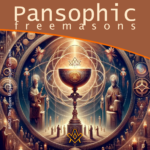 Unveil the secrets of Pansophic Freemasonry, a transformative journey through the ancient mystical traditions. Delve into the sacred realms of Rosicrucianism, Templar wisdom, Kabbalah, Gnosticism, and more. Discover the Graal, the sacred Grail that connects all esoteric paths. Embrace a holistic spiritual quest that reveals the profound mysteries of self and the universe. |
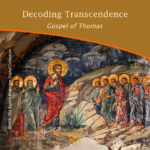 Dive into a spiritual journey where self-awareness is the key to enlightenment. The Gospel of Thomas and Masonic teachings converge on the profound truth that the path to transcendent wisdom lies within us. Embrace a diversified understanding of spirituality, emphasizing introspection as the gateway to a universally respected enlightenment. Explore, understand, transcend. |
 Philosophy the Science of Estimating Values Philosophy is the science of estimating values. The superiority of any state or substance over another is determined by philosophy. By assigning a position of primary importance to what remains when all that is secondary has been removed, philosophy thus becomes the true index of priority or emphasis in the realm of speculative thought. The mission of philosophy a priori is to establish the relation of manifested things to their invisible ultimate cause or nature. |
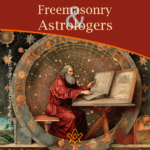 Unlocking the Mysteries: The Surprising Connection Between Freemasonry and Astrologers Revealed! Delve into the intriguing world of Freemasonry and explore its ties to astrological practices. Discover how these two distinct realms intersect, offering a fascinating glimpse into the esoteric interests of some Freemasons. Uncover the hidden links and unravel the enigmatic bond between Freemasonry and astrologers! |
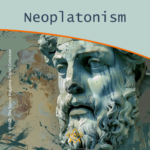 Neoplatonism, a philosophy with profound influence from the 3rd to the 6th century, merges Platonic ideals with Eastern thought, shaping Western and Middle-Eastern philosophy for two millennia. It emphasizes the unity of the individual with the supreme 'One', blending philosophy with theology and impacting major religious and philosophical movements, including Christianity and Islam. |
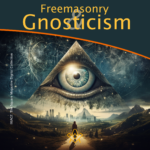 The enigmatic allure of Freemasonry's ancient rituals and Gnosticism's search for hidden knowledge capture the human spirit's endless quest for enlightenment. Between the stonemason's square and the Gnostic's divine spark lies a tantalizing intersection of philosophy, spirituality, and the pursuit of esoteric wisdom. Both traditions beckon with the promise of deeper understanding and moral elevation, inviting those who are drawn to unravel the tapestries of symbols and allegories. Whether through the fellowship of the lodge or the introspective journey of the soul, the paths of Freemasonry and Gnosticism represent a yearning to connect with something greater than ourselves—an impulse as old as time and as compelling as the mysteries they guard. |
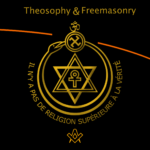 Embark on a journey through time and spirituality with our in-depth exploration of the Theosophical Society's Seal. This ancient emblem, rich with symbols, bridges humanity with the cosmos, echoing through the world's great faiths and diverse cultures. Our paper delves into the six mystical symbols, untangling their profound meanings and tracing their presence in historic art worldwide. Unaffiliated with worldly movements, these symbols open a window to esoteric wisdom. We also probe potential parallels with Freemasonry, seeking threads that might connect these storied organizations. Join us in unveiling the universal language of the spirit encoded within this enigmatic Seal. |
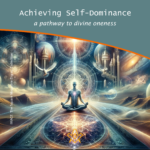 Discover the pathway to divine oneness through the concept of self-dominance. This thought-provoking essay explores the profound connection between self-control, spiritual growth, and achieving unity with the divine essence. With an interdisciplinary approach, it offers practical steps towards expanding consciousness and deepening our understanding of the divine. |
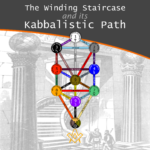 The Winding Staircase and its Kabbalistic Path The Winding Staircase in freemasonry is a renowned symbol of enlightenment. In this article, we explore its connection to Kabbalistic thought and how it mirrors the inner growth of a candidate as he progresses throughout his Masonic journey. From faith and discipline in Binah, to strength and discernment in Geburah, and finally to victory and emotional intuition in Netzach, each step represents a crucial aspect of personal development. Join us as we delve into the esoteric meanings of this powerful symbol. |
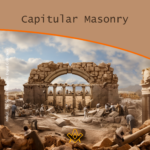 Unravel the mystic origins of Capitular Masonry, a secretive Freemasonry branch. Explore its evolution, symbolic degrees, and the Royal Arch's mysteries. Discover the Keystone's significance in this enlightening journey through Masonic wisdom, culminating in the ethereal Holy Royal Arch. |
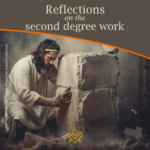 Reflections on the Second Degree Work Bro. Draško Miletić offers his reflections on his Second Degree Work – using metaphor, allegory and symbolism to understand the challenges we face as a Fellow Craft Mason to perfect the rough ashlar. |
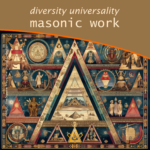 Diversity and Universality of Masonic Work Explore the rich tapestry of Masonic work, a testament to diversity and universality. Uncover its evolution through the 18th century, from the stabilization of Symbolic Freemasonry to the advent of Scottish rite and the birth of Great Continental Rites. Dive into this fascinating journey of Masonic systems, a unique blend of tradition and innovation. Antonio Jorge explores the diversity and universality of Masonic Work |
 Nonsense as a Factor in Soul Growth Although written 100 years ago, this article on retaining humour as a means of self-development and soul growth is as pertinent today as it was then! Let us remember the words of an ancient philosopher who said, when referring to the court jester of a king, “It takes the brightest man in all the land to make the greatest fool.” |
 Freemasonry: The Robe of Blue and Gold Three Fates weave this living garment and man himself is the creator of his fates. The triple thread of thought, action, and desire binds him when he enters into the sacred place or seeks admittance to the Lodge, but later this same cord is woven into the wedding garment whose purified folds shroud the sacred spark of his being. - Manly P Hall |
 By such a prudent and well regulated course of discipline as may best conduce to the preservation of your corporal and metal faculties in the fullest energy, thereby enabling you to exercise those talents wherewith god has blessed you to his glory and the welfare of your fellow creatures. |
 Jacob Ernst's 1870 treatise on the Philosophy of Freemasonry - The theory of Freemasonry is based upon the practice of virtuous principles, inculcating the highest standard of moral excellence. |
 Alchemy, like Freemasonry, has two aspects, material and spiritual; the lower aspect being looked upon by initiates as symbolic of the higher. “Gold” is used as a symbol of perfection and the earlier traces of Alchemy are philosophical. A Lecture read before the Albert Edward Rose Croix Chapter No. 87 in 1949. by Ill. Bro. S. H. Perry 32° |
 The spirit of the Renaissance is long gone and today's globalized and hesitant man, no matter ideology and confession, is the one that is deprived of resoluteness, of decision making, the one whose opinion doesn't matter. Article by Draško Miletić, |
 A Mason's Work in the First Degree Every Mason's experiences are unique - here writer and artist Draško Miletić shares insights from his First Degree Work. |
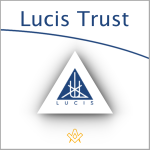 Initiation and the Lucis Trust The approach of the Lucis Trust to initiation may differ slightly to other Western Esoteric systems and Freemasonry, but the foundation of training for the neophyte to build good moral character and act in useful service to humanity is universal. |
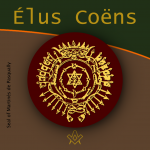 Who were the mysterious 18th century Élus Coëns – a.k.a The Order of Knight-Masons Elect Priests of the Universe – and why did they influence so many other esoteric and para-Masonic Orders? |
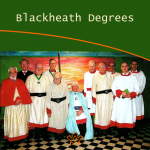 Bro. Chris Hatton gives us his personal reflections on the history of the 'house at Blackheath and the Blackheath Orders', in this wonderful tribute to Andrew Stephenson, a remarkable man and Mason. |
 Book Review - Cagliostro the Unknown Master The book review of the Cagliostro the Unknown Master, by the Editor of the book |
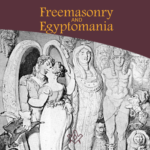 We explore fascinating and somewhat contentious historical interpretations that Freemasonry originated in ancient Egypt. |
 Is Freemasonry esoteric? Yes, no, maybe! |
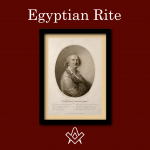 Egyptian Freemasonry, founder Cagliostro was famed throughout eighteenth century Europe for his reputation as a healer and alchemist |
masonic knowledge
to be a better citizen of the world
share the square with two brothers

click image to open email app on mobile device








